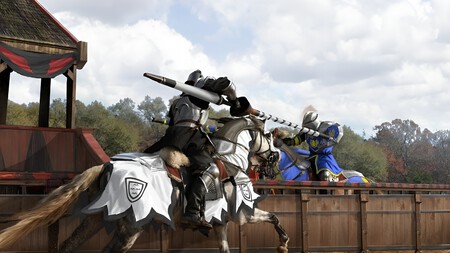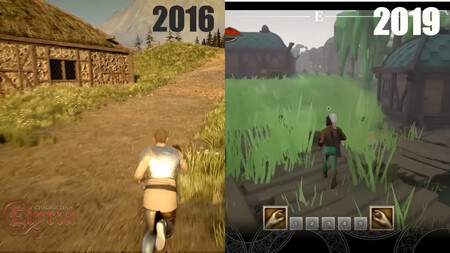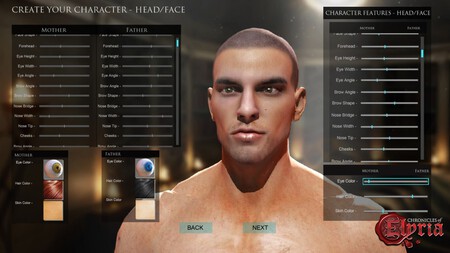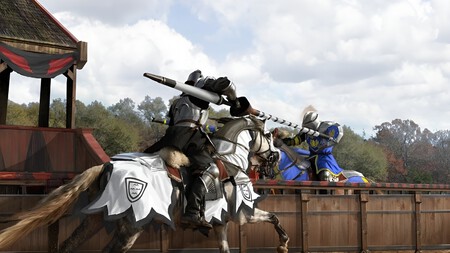With the innocence of someone who has the illusion of creating their own video game, the development of what promised to be the best MMO of all time began. “We have turned to Kickstarter to finance the project because video game publishers will not take this risk. They are incentivized to copy the latest great success and recolor it, but not all of us want a WoW clone or to play the same thing all the time. Our innovative ideas come from gamers and are for gamers. We want to play this, so we need your help to make it possible,” they said in their funding campaign. Now that the concept of ‘red flags’ is so fashionable, this red flag was the size of a whole building.
An MMO funded on castles in the air
Having managed to raise nine million dollars during its development years, the story of Chronicles of Elyria started poorly and got worse. A project too big, a team too small, and aspirations far removed from reality. Alva Majo, an independent developer, almost seemed to be talking about this MMO in one of his videos. “What you have is not an idea, it is a vision. What you have is not a well-defined idea with a main mechanic, but a series of fantasies formed in your head based on imagining things for a long time (…) In your head it sounds epic, because it is the result of your imagination and you can visualize it in a way that is really cool, but as an idea, it has all the problems we mentioned before and many more (…) Your idea is worthless if you can’t turn it into a real game,” he said.
Chronicles of Elyria fits the description because it was more of a vision than an idea. It was sold with cool phrases and mechanics that sound good, but are almost impossible to implement. It was the ultimate metaverse. A game where our characters aged and died, with their descendants inheriting their skills. It would have a genetic system to support this mechanic. Also, a completely destructible world that would be different each time the player logged in. Even exploration would be rewarded with a “really large” universe that should be mapped out by community explorers who could then sell their maps and narrate their adventures as a kind of modern James Cook. The problem is that these tremendously ambitious mechanics were just the beginning.


The world of Chronicles of Elyria would have destructible elements and would be different each time players logged in.
The small development team of Chronicles of Elyria had also promised a great deal of detail in the professions available in the game, PVP enabled in all areas, and that our character would be present in the world even when we were offline. All of this accompanied by a non-repetitive mission system that would change the way we understand MMORPG functionality and a story that, despite having events and a main plot, would be written by the players themselves. This is where the problems arise: adding mechanics to a video game is complicated, but creating new systems is the nightmare of any developer. That is why most titles, especially low-budget ones, have a few systems accompanied by a slightly larger number of mechanics and thrive by exploiting them to their fullest potential.

It would take a developer focused on blockbusters with experience in MMOs and willing to invest in their largest project ever. Even then, it would be an “idea” that I wouldn’t bet on very strongly. However, nine million dollars are not enough for absolutely anything. Even less so when the project management fell into the hands of a company with no experience. Jeremy Walsh, the main driving force behind Chronicles of Elyria, admitted in a blog published in July 2023 his ignorance of how to manage the finances of a small company and, in fact, he didn’t even know how crowdfunding fundraising worked. Returning to Alva Majo’s statements, he had a fantasy based on imagining things for a long time, but it was all pie in the sky.


Developers promised that the “real” graphics would come after finishing with the systems.
During the early years, Chronicles of Elyria lived off its promises. An unrealizable dream that was funded through contributions from a community that wanted to believe in the idea of an MMO like that. There were investors who put more than $10,000 of their own money to make the game a reality. It was they who were surprised in 2019 to see that the result was a Old Scape Runescape watered down. It didn’t resemble anything shown in the images up to that point, nor a gameplay taught years ago. Jeremy Walsh blamed it on an engine change and promised that the real graphics would come later. However, one cannot sell smoke for a long time before people lose patience.
Unable to secure more funds, the nine million dollars raised soon ran out. Layoffs began and the project was announced to be interrupted. Those who participated in the crowdfunding would never see their money back. A class action lawsuit was considered but was not accepted as the funds raised had been “well” managed, in the sense that they were used to develop the game and meet the company’s expenses without lavish spending. Jeremy Walsh was not a scammer who had lived the high life and, to a certain extent, it is easy to empathize with him. He had a dream and genuinely believed he could make it happen.


Although unconfirmed, everything points to Chronicles of Elyria passing off highly elaborate concept art as ‘screenshots’.
Walsh simply got caught up in his own project, showing clear signs of tunnel vision as he thought that difficulties were just obstacles to overcome. According to his own admission, he sold some of his properties to manage larger budget margins and start with Chronicles of Elyria. The problem is that most of the money being played was not his, and here comes the sad part. If this game has achieved anything, it is demystifying the role of ideas. If it had been everything it wanted to be, no one would have doubted for a second to play it. The problem is that it wanted to be so many things at once that in the end it couldn’t be any.
An MMO with scenarios that the community could transform through their wars and subsequent reconstructions? Difficult, but possible. An MMO based on aging characters and the need to have descendants who then inherit the skills? You’ll have to tread very carefully, but you can do it. An MMO without repetitive missions and close to an ARPG experience? I find it hard to see, but maybe it is feasible with the right team. An MMO that combines all this with even more mechanics and systems? It’s best to start looking for another project. There are very complex titles that have worked. For example, Project Zomboid has a sickening level of detail. However, it is thanks to a development that has lasted over 10 years. It was launched in 2013 and, as it sold well, it has continued to add content and other ideas until it is almost perfect.

Although unintentional, the story fits perfectly with the current state of the video game industry in recent days. This does not mean that anyone with the dream of creating a video game cannot succeed, but they need to know very well the reality of how the industry works before embarking on such an adventure. Walsh had experience working at Pandemic and still didn’t realize all the mistakes he was making with Chronicles of Elyria. To this day, he has not given up on his dream and, although he doesn’t think it can be an MMO, he seems to be working on a survival game with similar but less ambitious ideas. Will we ever see it? I have many doubts.
In 3DJuegos | I Entered the fantasy RPG everyone is playing with no expectations, and found the least expected. Analysis of Throne and Liberty
In 3DJuegos | The October Steam Next Fest is here! Here are 12 PC game recommendations that already have demos


